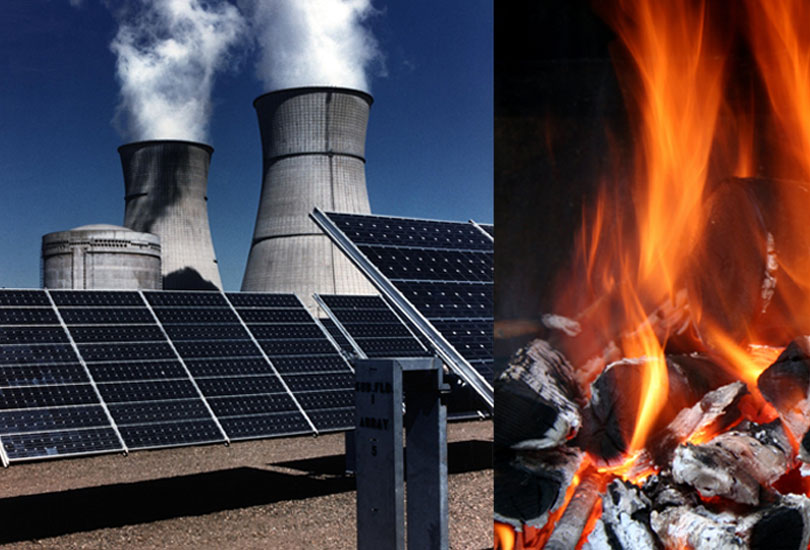Fossil Fuels vs Solar Energy – What’s the Difference?
Consumers use fossil fuels because they are cost-effective and convenient – at least for the time being. Because the global supply of fossil fuels is finite, experts do not consider them renewable energy. Solar energy, on the other hand, is a completely renewable natural energy source.
The sun will not cease shining any time soon, and it is freely available all around the planet. The quantity of sunshine we receive, on the other hand, fluctuates depending on our location, the time of day, the season, and the weather. If you reside in the Northern Hemisphere, for example, a south-facing roof is perfect. Even if this isn’t the case, solar energy can still be beneficial, especially if your roof doesn’t receive much shadow throughout the day.

Solar energy, like every other form of energy, has advantages and disadvantages. Solar energy’s two primary drawbacks are its high upfront expenditures and poor energy density. Lower energy density isn’t always a bad thing; it just indicates that more solar panels are required to produce the same amount of electricity. Because only particular wavelengths of light striking the panel can be converted to electrical energy, solar energy production is determined by the physics of the panel.
Even though they appear to be more economical than solar energy choices, the health, environmental, and economic costs of fossil fuels exceed their advantages. Here are some factors to take into account by Dwayne Morrison from Astrum Solar, when comparing both fossil fuel and solar energy.
Long-term availability
Solar power is a renewable energy source. We will not run out of sunshine to power our houses, automobiles, or other belongings as long as the sun exists. Non-renewable resources, on the other side, are fossil fuels. That is all we have once the Earth’s fossil fuel reserves have been depleted. They will renew themselves in theory, but it will take millions of years. It will be too late to use them by then.
There’s also the problem of accessibility. We may soon find ourselves in a situation where the only remaining fossil fuels to extract from the Earth are in regions that are inaccessible or so expensive to reach that they are no longer worth mining. In any case, fossil fuels will cease to be a viable energy source at some time.
Solar energy, unlike fossil fuels, will remain a viable energy source as long as humanity have access to direct sunshine. While fossil fuels will be gone in millions of years, the sun should last far longer.
Our capacity to capture sunlight and convert it to electricity will increase as photovoltaic solar technology advances.
Emission
We’re all aware that carbon dioxide (CO2) is produced as a byproduct of fossil fuels. This CO2 is retained in our atmosphere, causing the Earth to retain more heat as a result. This heat retention eventually leads to climate change, which will alter traditional weather patterns throughout the planet while also making them more abrupt and severe.
Climatologists have known about these issues for a long time, and the public is gradually warming to the topic.Solar panels, unlike fossil fuels, do not emit pollutants or carbon dioxide into the atmosphere. They also have a negligible environmental impact. According to the US Energy Information Administration, all of above is true (EIA.)
If we want to minimize our carbon footprint by lowering our emissions, switching to solar energy is one of the greatest methods to do so.
Cost
Solar energy costs and the lack of CO2 emissions from solar panels are inextricably related, believe it or not.
Solar energy still has a long way to go before it becomes the most popular renewable resource on the globe, much alone the most popular form of electricity, but its appeal is obvious. That’s because an increasing number of Americans want to decrease their carbon footprint, and the solar energy sector is responding by innovating and improving.
Over the last ten years, the cost of solar energy has reduced by up to 73 percent as a result of technical advancements. According to the Office of Energy & Renewable Energy (EERE), the cost of solar has consistently decreased every year over the past ten years.
So, while solar may not be cheap for all individuals and all homes right now, it is rapidly becoming so. On the other side, we may anticipate fossil fuels to grow increasingly expensive as their reserves are depleted and mining gets more expensive.
Efficiency
Solar energy panels may transform the sun’s rays into power with an efficiency rate of 15-22 percent as of 2017. That may not appear to be a good thing at first, but consider it in the perspective of other energy sources.
Car engines, according to Forbes, convert 20% of a car’s gasoline into energy. The remainder is squandered heat energy. What happens to the remaining 80% of solar energy that isn’t used? It lights up whatever it comes into contact with.
Coal is 33 percent to 40 percent efficient, but it is a disaster for the environment, unlike solar.
The point is that solar power is not now as efficient as it will be in the future, but it is improving. Solar panels are now far more efficient than they were previously. The fact that panel efficiency is improving is one of the reasons why solar costs will continue to fall.
